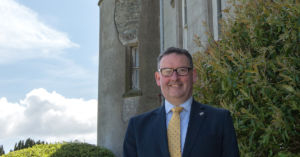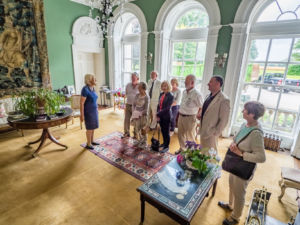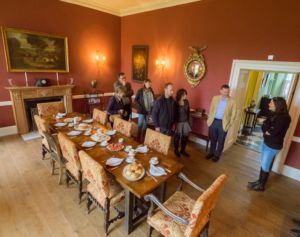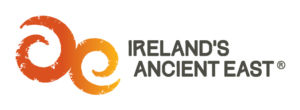Frank Kelly, a former banker, is now running an experiential luxury travel firm from Tipperary. His target audience is the ‘culturally curious’.
My formative career was in banking in London with NatWest Bank. After “escaping” branch banking, I had a series of relationship management roles in franchise finance and international banking. I then moved into banking software sales with travel around African and Asia. Then, the entrepreneurial bug caught me, and I went into marketing consultancy and event management.
What is Hennessy & Furlong?
Hennessy & Furlong, named after my godparents, specialises in experiential luxury travel. We offer customers exclusive access to private castles and historic homes. Guests are welcomed inside by the owners themselves, never an employee guide. Our guests enjoy the experience of being shown around special private homes by their owners. The magic is enjoying relaxed hospitality with their hosts.
What prompted you to start the business?
There was no eureka moment as such. I know it’s a hackneyed phrase about following your passion, but I have always been excited by travel. Not just going to signature places but finding those places that are “behind the scenes” and not readily accessible.
Living in London, I have the pleasure of a private tour of No. 10 during Tony Blair’s premiership, a reception at the Houses of Parliament and other exclusive experiences. The excitement of those private visits tour remained with me and is the benchmark when it echoes with the experiences for our guests
Also, when I travelled on business around Asia and Africa, I was often invited inside places that one would never read about online or in any guidebook.
How did you start the business?
I was very fortunate to go to the UCD Innovation Academy to develop the concept during an intensive programme in “Innovation, Entrepreneurship & Enterprise”.
It’s a “learning-by-doing” programme. It made me realise the importance and necessity of a diverse team to bring an idea to fruition.
Explain more about teamwork and diversity
Through The UCD Innovation Academy, I met other students and alumni who recognised the potential for Hennessy & Furlong. One fellow student, Jason Cooke, came on board as our brand director. Likewise, David Keane, another alumnus, was setting up his website design consultancy, Inkstone. Keith Currams, a videographer, again an Academy graduate, was attracted by the potential to share the Hennessy & Furlong brand with engaging videography. Surrounding ourselves with others who have an entrepreneurial mind-set is vital.
A broad range of skills and knowledge in the team is crucial to unleashing the value of our experiences to our prospective guests and stakeholders.
How supportive are state agencies?
Tipperary Local Enterprise Office was our first stop. They were encouraging with both seed funding, in-kind support with digital marketing and sales leads.
Likewise, Fáilte Ireland was supportive with dedicated mentorship and group workshops with other businesses in the cultural tourism space. The development of the Ireland’s Ancient East branding was perfect timing for us. That new destination brand, aimed at the “culturally curious” aligns neatly with our brand message.
What needs do you satisfy?
We all have a natural curiosity about people and places that may not be readily accessible. Through our network of contacts and careful relationship building, we can arrange access to places and people that would not be usually available. Indeed, Fáilte Ireland refers to our market as the “culturally curious”.
What trends do you see in the travel marketplace?
Authentic, local experiences are increasingly being sought by visitors. Indeed, there is an increasing demand for experiences as opposed to products and possessions.
How do you find these people and places?
Meticulous research, leveraging our network and referrals from people “in the know”.
How did you validate your idea?
The UCD Innovation Academy mantra is “customer discovery”. In practice, that meant conducting “customer conversations” with visitors as they were leaving sites such as The Rock of Cashel and Bunratty Castle. We also listened carefully to others in the travel space: the five-star hotel managers, the premium tour operators and the travel writers.
What is your key customer segment?
Our target guests are American visitors who are well-educated and for whom travel is part of their lifestyle. They value authentic experiences and love exclusivity.
What is your focus at the moment?
• Keeping our team focused, motivated and excited;
• Sales and revenue – the heartbeat of any business;
• Finding smart investors (as opposed to passive ones) who share our passion and want to be part of our future success, as well as earning a return on their investment.
Is the business scalable?
Good question. In our view, yes. We watch the evolution of the London-based premium home rental company ONEFINESTAY which is a “high-end AIRBNB” though with a concierge service. Likewise, in the United States, IFONLY sells excellent experiences. For us, scalability will be contingent on a mix of enthusiastic hosts, adequate capital and growing out a team of people.
What is your ultimate ambition?
To be recognised as the go-to company for exclusive experiences; to attract people and partners who share our passion for unearthing unique, enriching and memorable experiences; to build a financially solid company that rewards our people, our hosts, and our investors.
Any advice for other startups?
Keep focusing on the customers’ problem as much as possible before designing your solution. Surround yourself with a diverse and motivated team. Validate, iterate as needs be – and never, ever give up.
Images © Stephanie Joy Photography; © Kees Van Seventer.
Website: www.hennessyfurlong.com.
This post was originally published here - https://www.thinkbusiness.ie/articles/hennessy-and-furlong/ on













